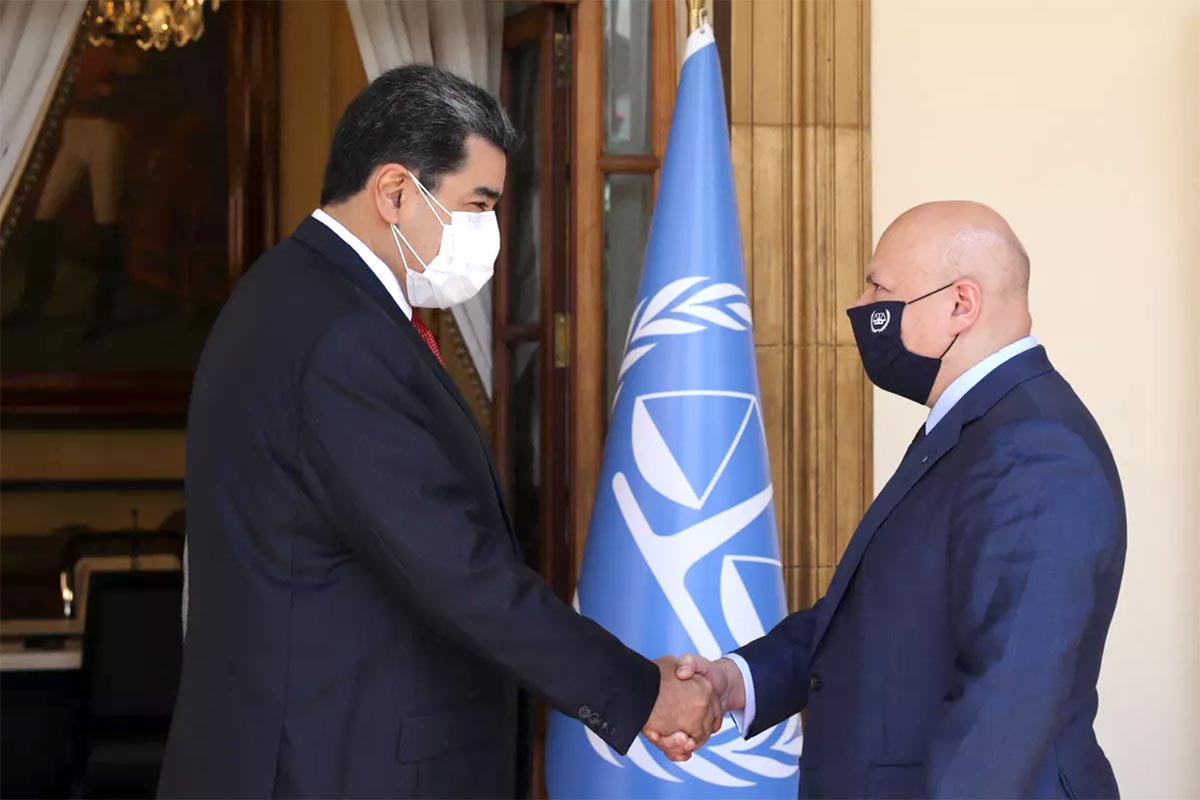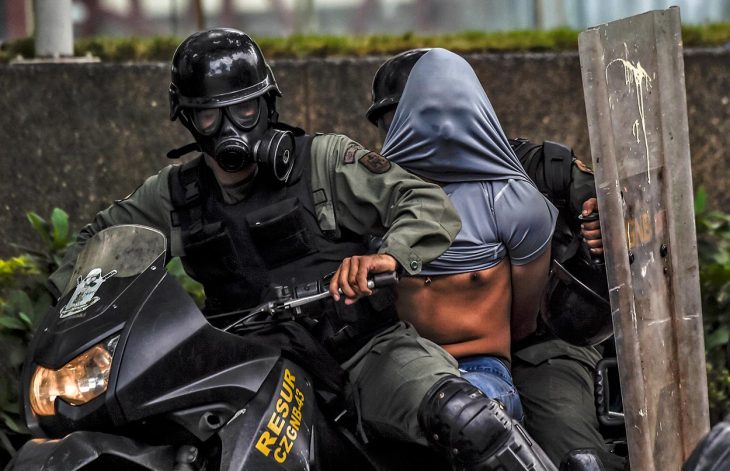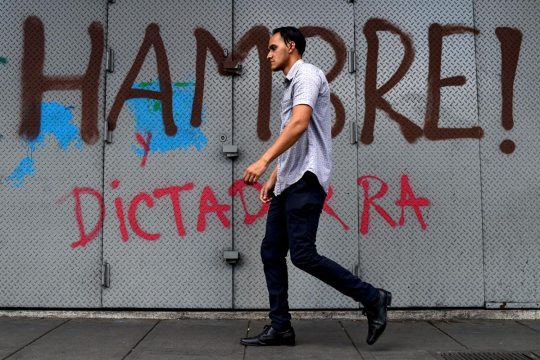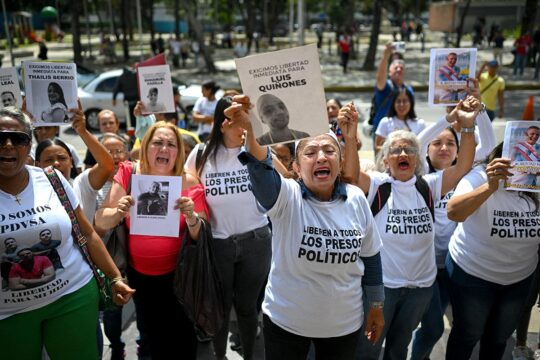This is “a huge step for victims in Venezuela,” says Tamara Taraciuk Broner of Human Rights Watch (HRW), an international NGO, because “it's taken years to have a meaningful option of justice for the crimes that have been committed by the Maduro regime.” It’s “a landmark,” acknowledged the conflict analysis think tank International Crisis Group (ICG) in a special report stressing that this is the first time the court has opened an investigation in the Americas.
On November 5, at the end of a three-day visit to Venezuela, the new Prosecutor of the International Criminal Court (ICC) Karim Khan announced that he will launch an investigation into crimes against humanity in the country, and signed a memorandum of understanding (MoU) with the government of President Nicolas Maduro.
The ICC Office of the Prosecutor had started looking into Venezuela in 2018 when it opened a “preliminary examination” into allegations of systematic human rights violations during the massive demonstrations that engulfed Venezuela between April and July 2017. The confrontation between the Maduro government and the opposition was then at its height. Argentina, Canada, Colombia, Chile, Paraguay and Peru swiftly followed up with a formal referral to the ICC Prosecutor – a first in the history of the Hague-based international court.
Confusion around the agreement
By ICC standards, a two and half years preliminary examination is not long. But Khan seems to want these examinations to have a limit in time. On that same trip, he also closed the one on Colombia that had been opened for 17 years.
Human rights NGOs have praised the move in Venezuela but it is the additional MoU that has caused confusion among the victims, said Michelle Reyes Milk, professor of international law at the Catholic University of Peru. The MoU states that Caracas will “adopt all necessary measures to ensure the effective administration of justice, in accordance with international standards, with the support and active engagement of the Office of the Prosecutor”. But it also acknowledges that the Prosecutor may regard those efforts as unsatisfactory. And it notes Venezuela’s obligation to “facilitate the effective discharge of the Prosecutor’s mandate” on Venezuelan territory.

“To me, it looks like an agreement that could have been sought during a preliminary examination,” says Reyes Milk. “It re-emphasises obligations that are already in the Rome Statute” and “having an investigation with several years or more during which cases are not actually initiated [could be] even more damaging towards the cause of justice and the expectations of victims” than having an ongoing preliminary examination, she says.
We’ve seen this before
Reyes Milk has long advised victims groups that the ICC is just one part of the puzzle, “But it's a very important part,” she says, because “there's been hardly any national measures taken to address the crimes under international law since 2014.”
The MoU keeps open the door to Caracas itself holding perpetrators accountable. Taraciuk Broner agrees it is an opportunity “to push for meaningful accountability”. But she thinks the ICC prosecutor's office is treating the Venezuelan authorities “very nicely” by giving them “space to present whatever information they think they can present to justify that investigations are possible in Venezuela to a certain extent”. She cautions “there's so much to do there that there's absolutely no way that whatever information they're sending to the court today will get them off the hook.” She describes it as “a game that we've seen elsewhere where repressive governments want to show that they're doing something about cases so that they can avoid the investigation and the international scrutiny.” But for her “the truth is that in the current context of Venezuela, it's impossible for these investigations to move forward meaningfully and for the complementarity principle to kick in. The government will most likely try to present a number of reforms as a way of maybe trying to to show some measures being taken” but she doubts that they would “really fulfil the complementarity requirement”.
Who will be thrown under the bus?
Realistic options for the Venezuelan authorities seem limited. They could open some cases against very low-level perpetrators, says Reyes Milk, but that is unlikely to meet the complementarity requirements. However, low-level trials could provide “very relevant information, regardless of how high up they are in the chain of command,” she thinks.
During the preliminary examination, the Office of the Prosecutor focus was on reports of arbitrary detentions carried out by civilian authorities, the armed forces and pro-government individuals in the period since April 2017, and particularly cases that reportedly led to torture, sexual violence and persecution of opposition supporters. The Prosecutor’s 2020 report “names a lot of these institutions that would bear responsibility for some of the crimes,” says Reyes Milk, including the intelligence agency, the Bolivarian guards, the armed forces, the police and security forces. But “you have a whole different level when you start looking through civilian authorities,” she warns.
So what would happen if they select, “one to three individuals that are more high level and they throw those under the bus?” wonders Reyes Milk. The ICG suggests that it “could create tremendous blowback in the government coalition, above all in its police and military wings.”
Reforming the judiciary
In 2021 UN fact-finding missions under the Human Rights Council “talked about the complicity of Venezuelan judicial authorities in the repression,” says Taraciuk Broner. Independent investigation “is impossible in today's Venezuela” because the “judiciary is an appendix of the executive branch,” she says. According to her, since 2004 the government and its supporters have taken over the Supreme Court and “this absolute lack of judicial independence in the highest court has trickled down to the entire justice system. So there is no way that a judge will stand up and document abuses. In fact, what we've seen is that the judiciary is more of an accomplice of the abuses than an institution that moves forward with investigations and accountability”. The ICG seems to concur, assessing that “genuine prosecutions of the sort demanded by the ICC would also require an overhaul of the Venezuelan justice system.” In discussions between opposition and government, judicial reform is on the agenda. “So there is an opportunity there to use the pressure built by the opening of the ICC to agree on meaningful steps to reform the judiciary,” says Taraciuk Broner. But “how much are authorities willing to give up? How pressured do they feel by a potential ICC prosecution and who are they willing to give up in those negotiations?” she asks.








